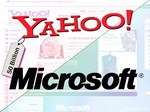Microsoft, Yahoo and the Glacial Pace of Traditional Marketers
We welcome guest columnist Sean X Cummings who, in response to the ongoing Yahoo/Microsoft acquisition dance along with Google's response, has several things to say about the deal and how the pace of technology growth is out pacing the ability of some marketers to keep ups with and master the influx of new media.
The Microsoft/Yahoo deal is often analyzed on the differences between technology companies, and media companies, offline, and online, threats to companies within that world, and outside, and those who interfere. Much of this misses more fundamental issues.
The reality is that the promise of digital, from an advertiser's perspective, has largely not been realized. And whereas Microsoft is not as beholden to it, Yahoo is. The devices are becoming ubiquitous; cell phones, web, widgets, blogs, social media applications and more. But they are prevalent only because of proactive consumer adoption. A device becoming ubiquitous does not make the medium ubiquitous, nor standardize the creative content of the media delivered to them. They are not all equal, nor impact the consumer in the same way. We are still searching for the emotional impact of television on the consumer in digital. A digital medium where something can be done once, scaled with minimal marketing resources, and have the same societal impact.
For the first time in history the pace of adoption of the newer mediums becoming ubiquitous was faster than the tenured careers of those C level exec's who understood them and who were supposed to fully grasp their use for marketing purposes. This created the dichotomy we are dealing with now. Technology will drive the future, but without proper application of marketing techniques even the coolest widget is useless.
Creatives and most people in marketing have been siloed for years. Attempts at integrating the internal fiefdoms within companies, let alone across companies being acquired, have largely been disastrous because of the lack of most new technology marketers understanding the fundamental marketing principles of the old. Ask any digital marketer to tell you what the 4 C's, or the 5 P's are and you'll probably get a blank stare. That's because most of them rose through the ranks with the understanding of technology and not the consumer.
The drive that spawns the diversity of creativity of all these 'new' mediums, the technology behind them, the freedom we get to just develop something new without constraints, is the same aspect that exacerbates the problem. New mediums are created because the technology 'can,' instead of asking whether it is of use to the consumer, and the advertiser... whether it 'should.' It is done so because the digital side easily affords the ability to test, throw it up against the wall and see if it sticks. If it doesn't stick, you just move on to the next greatest tech widget. That is what creates the instability for those charged with developing the content which will flow through these new mediums.
When the people charged with developing content finally get cycled out, the media development stabilizes and the understanding of nuances is realized, only then will we fully grasp new technology's place in marketing. We may never again have that single, scalable, advertising ability to impact consumer emotions and that may sound like death for the marketer. The chaotic multitasking, multi-viewing consumer who relies on a variety of inputs, many of them outside of the advertiser's control is proving too difficult for marketers to grasp. The engagement and the fundamentals of messaging need to reach that critical mass of understanding by marketers before that grasp is realized. I have long lost hope that people who already inhabit senior roles at traditional companies will ever 'get' it.
On a positive note, companies are beginning to position themselves for the changeover. Whether it is a media giant or digital consolidation, placing people who get the big picture in management positions equipped with the right tools, equipment and staffing versus less meaningful coaching positions is the key to moving ahead.
What we have now at most traditional companies, is the idea you can install new helmsmen and just pound on a drum until you have your staff row in unison. That works for the old linear model of replacing employees as if they were cogs, but not necessarily in the new, more dynamic world of business in which there must be cross-collaboration of intelligence to win.
Microsoft is a software company. Yahoo is an internet company with the kind of engagement distribution MS needs. The reason Google is trying to block the deal is that the combination of Yahoo and Microsoft encroaches on their bread and butter in advertising: search. It is very unlikely that with Microsoft's diversification that any new software threatens. Apple is better, Linux has got headway, but that is just OS. The installed base of Office is what secures Microsoft's position. In essence, forced compatibility. With Google, all someone has to do is develop the next 'big' game changing thing in search to threaten their entire house of cards. A single 'someone solved it.' Never has a company so big been so reliant of one lynch pin, that, if pulled, could blow up the entire enterprise.
Writer, pundit, curmudgeon; regular columnist for iMedia, and self described "hacker-geek with a marketing degree," Sean X has worked on the digital side of advertising and marketing for over 15 years. In that time he has spoken at ad:tech, iMedia, 212, SF BIG, the Yahoo! Summit, Internet World, on ABC, and NBC, as well as consulted for a number of government agencies on the impact of the Internet on society.




Comments
Sean, you really have the take on it. Big picture is everything. Boy, would I love to talk to you!
Sean-
What if Google's killer app was not Search, but its Network? What if the dark fiber Google has laid around the globe supported the only network truly capable of delivering a high-performance Office-replacement (or any other computationally-intensive application) that can be deployed with the flick of a switch at a global scale? What if Google could acquire or fast-follow any start-up in the space before they could match the scale? Would you call that a one-trick pony -- as you seem to in your last paragraph -- or a company with an incredible barrier to entry?